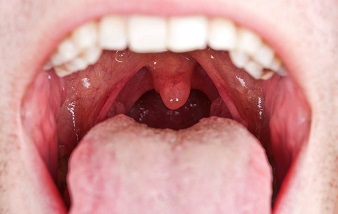COVID-19 News: Japanese Study Warns Of Persistent Gustatory And Saliva Secretory Dysfunctions After Recovery From COVID-19
Thailand Medical News Team Aug 22, 2023 1 year, 7 months, 4 weeks, 1 day, 9 hours ago
COVID-19 News: The ongoing battle against the COVID-19 pandemic has unearthed a multitude of symptoms that can extend beyond the acute phase of the disease. While common symptoms like fever, cough, and shortness of breath have been widely reported, there remains a less-explored territory of post-recovery effects that can linger for an extended period as reported in various studies and past
COVID-19 News reports.

One such area of interest is the manifestation of oral symptoms in patients who have survived COVID-19. A recent study conducted at Asahi University School of Dentistry in Mizuho, Japan, delved into the world of persistent gustatory and saliva secretory dysfunctions in individuals who have recuperated from the virus. This research sheds light on the prevalence, potential causes, and implications of these oral sequelae.
Unmasking the Oral Manifestations of COVID-19 Recovery
While the symptoms of COVID-19 are well-documented during the acute phase of the disease, relatively little is known about the oral symptoms that may persist after recovery. To address this knowledge gap, researchers embarked on a comprehensive review of existing scientific literature. The study, which had a cut-off date of September 30, 2022, aimed to unravel the prevalence and potential mechanisms underlying persistent gustatory and saliva secretory dysfunctions in COVID-19 survivors.
Exploring the Prevalence of Gustatory and Saliva Secretory Dysfunctions
The research revealed a significant prevalence of gustatory and saliva secretory dysfunctions in individuals who had successfully fought off COVID-19. Gustatory dysfunctions, encompassing ageusia (total loss of taste) and dysgeusia (impaired taste), were reported by 1-45% of COVID-19 survivors at follow-ups ranging from 21 to 365 days. Similarly, saliva secretory dysfunctions, including xerostomia (dry mouth), were reported by 2-40% of survivors at follow-ups ranging from 28 to 230 days. The prevalence of these sequelae appeared to vary based on factors such as ethnicity, gender, age, and disease severity.
Unveiling the Interplay Between Gustatory and Saliva Secretory Dysfunctions
An intriguing aspect of the study was the co-occurrence of gustatory and saliva secretory dysfunctions in many COVID-19 survivors. This association was not confined to a specific geographic or ethnic group. Rather, individuals across different cohorts reported both types of oral sequelae. Notably, the prevalence of xerostomia was moderately correlated with that of ageusia/dysgeusia. These findings suggest a potential underlying connection between the two types of dysfunctions.
Unraveling the Potential Mechanisms
The researchers delved into the possible mechanisms that could contribute to the persistence of gustatory and saliva secretory dysfunctions. One significant avenue of exploration was the interaction between the virus and certain receptors. The SARS-CoV-2 virus uses its spike protein to bind to the angiotensin-converting enzyme 2 (ACE2) receptor on host cells. This interaction enables the virus to enter cells and initiate infection. The study uncovered evidence that ACE2 recept
ors, as well as other relevant proteins, are present not only in taste buds but also in salivary glands. This presence of viral entry points suggests that the virus could target these oral tissues, leading to the observed dysfunctions.
The Role of Zinc in Gustatory and Saliva Secretory Functions
Zinc, an essential micronutrient, emerged as a potential key player in the persistence of these oral symptoms. Zinc is known to play a crucial role in taste perception and the secretion of saliva. Its deficiency has been linked to impairments in these functions. COVID-19 patients often experience hypozincemia, a condition characterized by reduced zinc levels in the blood. This deficiency, induced by viral infection, could contribute to the ongoing gustatory and saliva secretory dysfunctions observed in recovered patients.
Implications for Patient Care and Quality of Life
The findings of this study have important implications for the care of post-COVID-19 patients. While the oral symptoms explored may not be life-threatening, they can significantly impact an individual's quality of life. The persistence of ageusia, dysgeusia, and xerostomia can take a toll on overall well-being, affecting daily activities such as eating, drinking, and communicating. As a result, the study calls for continued attention to the oral health of post-COVID-19 patients, even after they have been discharged from the hospital.
Conclusion: Looking Beyond Recovery
In the battle against COVID-19, the fight does not end at recovery. The study conducted by Asahi University School of Dentistry offers a valuable glimpse into the world of persistent oral sequelae that can affect survivors long after the acute phase of the disease. Gustatory and saliva secretory dysfunctions, which can have a lasting impact on quality of life, are found to persist due to the interaction between the virus and receptors in oral tissues, as well as potential zinc deficiency induced by the infection. By shedding light on these post-recovery effects, the research emphasizes the importance of comprehensive care and ongoing attention to the oral health of individuals who have triumphed over COVID-19.
The study findings were published in the peer reviewed journal: Medical Principles And Practice.(Karger)
https://karger.com/mpp/article/doi/10.1159/000531373/844623/COVID-19-Oral-Sequelae-Persistent-Gustatory-and?searchresult=1
For the latest
COVID-19 News, keep on logging to Thailand Medical News.
